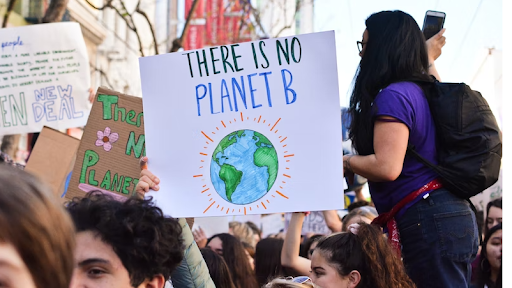Climate change

Unsplash
A sign at a global warming protest let’s everyone know we only have one planet.
March 30, 2023
It is winter, yet our first sight of snowfall was at the beginning of March. Many of us look forward to a snowy Christmas, snow days, and sledding, but what happens when the snow stops?
According to NJ.com, New Jersey usually gets an average of 23 inches of snow per year and yet this year we have had less than 10 inches of snow. The reason for this change in weather has to do with climate change.
A lot of places are seeing a decline in snowfall which also means a decrease in the agricultural and municipal water. Even if there is snow, it evaporates faster because of the warmer climate. Snowfall is an important aspect of winter. Many people depend on snow due to it providing water when the ice melts in the spring. The epa.gov reports that, “snowmelt provides 75 percent of the water supply. Not only is our favorite winter activities such as snow boarding at risk, there is a much bigger problem.
Climate change is expected to worsen air quality from both natural and human-made sources which increases your chances of cardiovascular disease, respiratory illnesses, and cancers in unsafe populations.
The New York Times reports this past summer of 2022, was one of the hottest on record in New Jersey. Extreme weather events, excessive heat, humidity, heavy rainfalls, and drought, or natural weather-related disasters, lead to both immediate and long-term effects on human health.
Excessive heat and increased air pollution can worsen chronic conditions, such as asthma, COPD, and increase the incidence of lung cancer.
According to www. noaa.gov, “Heat is one of the most deadliest weather phenomena. As ocean temperatures rise, hurricanes are getting stronger and wetter, which can cause direct and indirect deaths.”
Globally, weather-related natural disasters like storms and flooding have risen since the middle of the twentieth century, with tropical storms and hurricanes being major weather-related threats to the Mid-Atlantic coast.
We are seeing the effects of climate change and hoping that something will change soon for the better.
We can start trying to conserve energy by using the reduce, reuse, and recycle method.
At the same time, scientists are trying their best to fight climate change. However, scientists can not, until we assist and agree with what they are trying to do.
In the future, there may be no snow even in places that are usually covered in a white blanket if we don’t start taking action now. To prevent climate change and help the environment, we need to come together and be more thoughtful of how we treat our home, Earth.